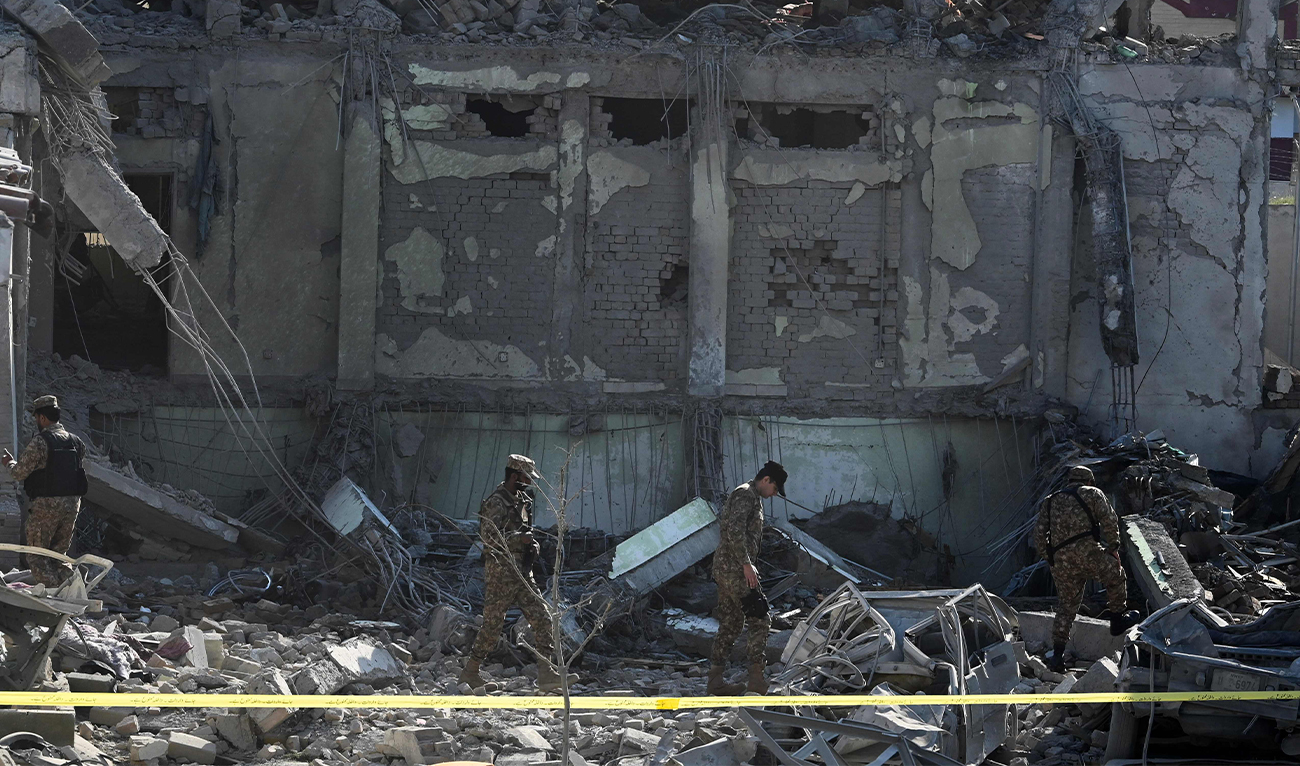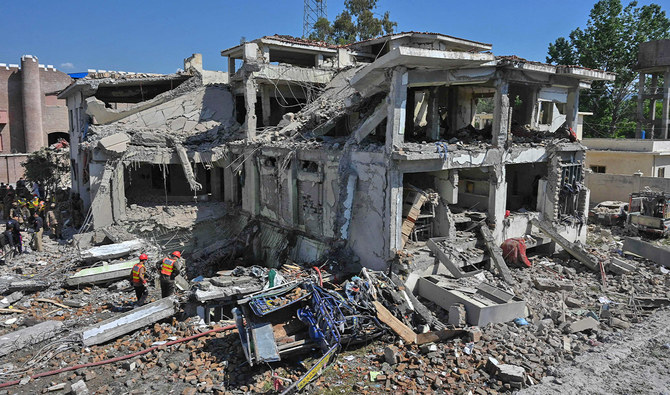PESHAWAR: At least 17 people, mostly policemen, were killed and another 68 wounded in twin blasts that rocked a counter-terrorism facility in the northwestern Pakistani town of Kabal late Monday, officials said, adding they were investigating if the incident was an “act of terror.”
The explosions were so powerful that they levelled the counter-terrorism police station in Kabal town of Swat district in the northwestern Khyber Pakhtunkhwa province that neighbors Afghanistan.
The incident came amid a renewed wave of militant attacks on police and security forces in Pakistan’s restive northwest, particularly after the Pakistani Taliban called off their fragile truce with the government in November last year.
Junaid Marwat, the Kabal administrator, said the explosions were triggered by a short circuit at the armory, adding the deceased included two civilians and four others were among the wounded.
“An initial probe suggested ammunition stored inside the police station caused the explosions, but the involvement of an act of terror is being investigated,” Marwat told Arab News on Tuesday.
“We have completed the rescue and relief operation and the wounded are being provided medical treatment.”

Rescue teams search for victims in the rubble of a badly damaged building a day after multiple explosions caused by a fire in a munitions cache levelled a specialist counter-terrorism police station in Kabal town of Swat Valley, in Pakistan’s northwestern region of Khyber Pakhtunkhwa province, on April 25, 2023. (AFP)
Swat District Police Officer (DPO) Shafiullah Gandapur ruled out the possibility of an attack from outside the facility, saying munitions inside the basement of the old Counter-Terrorism Department (CTD) building had exploded.
“After inspecting the crime scene by our experts, no evidence of any outside attack or suicide attack could be traced,” he said.
“Several blasts took place one after another which showed the explosions were caused by explosive materials at the ammunition store.”
Irfanullah Wazir, the top administrator in Swat district, told Arab News levelled the building and the district administration sent in heavy machinery to rescue those who were trapped under the rubble.
“The law enforcement officials have yet to identify whether it was a suicide attack or the ammunition inside the police station caused the explosions,” he said.

Security personnel inspect a damaged building a day after multiple explosions caused by fire in a munitions cache in a specialist counter-terrorism police station in Kabal town of Swat Valley, in Pakistan’s northwestern region of Khyber Pakhtunkhwa province, on April 25, 2023. (AFP)
An emergency was declared at the Kabal tehsil headquarters hospital as well as the Medical Teaching Hospital in Saidu Sharif to ensure timely treatment of the wounded.
Eight bodies were brought to the Saidu Sharif Medical Teaching Hospital, Dr. Muhammad Khan, deputy medical superintendent (DMS), told Arab News.
The Kabal tehsil headquarters hospital received nine bodies, according to surgeon Dr. Imran Khan.
Bilal Faizi, a spokesman at the Rescue 1122 service, told Arab News on Tuesday a search for survivors under the rubble was about to complete.
“Our team has retrieved 15 dead and rescued 45 injured, including a woman,” he added.

Security officials inspect the site a day after multiple explosions caused by fire in a munitions cache levelled a specialist counter-terrorism police station in Kabal town of Swat Valley in Pakistan’s northwestern region of Khyber Pakhtunkhwa province on April 25, 2023. (AFP)
In a Twitter post, Pakistan Prime Minister Shehbaz Sharif expressed sorrow over the loss of lives in the incident.
“The nature of the blast is being investigated and as soon as the security agencies reach the conclusion, it will be shared with the nation,” he said.
Swat once used to be a hotbed of militancy and was for years controlled by the Pakistani Taliban until they were flushed out in a military operation that began in 2009.
Pakistani police and security forces still maintain a significant presence in the valley, which has been prone to insurgency.



















